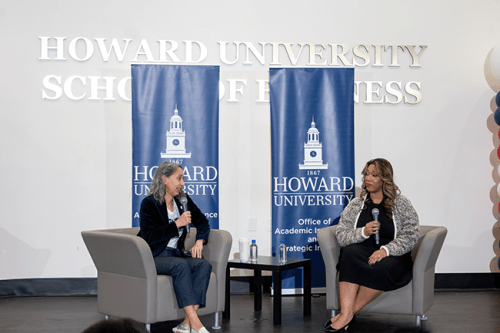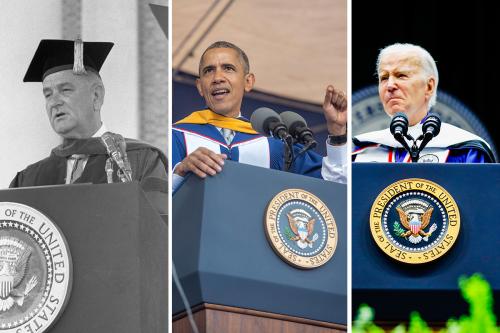
WASHINGTON – Howard University’s Karsh STEM Scholars Program (KSSP) welcomes its fourth annual cohort of emerging scholars to join Howard’s premiere undergraduate scholarship program for students committed to pursuing graduate and professional studies in STEM-related disciplines. Founded in 2017 as the Bison STEM Scholars Program, and recently renamed following a $10 million endowment gift from the Karsh Family Foundation, the KSSP is thoughtfully designed to increase the number of underrepresented minorities earning a Ph.D. or combined M.D./Ph.D. in a STEM discipline.
The KSSP attracts hundreds of highly competitive high school students annually and selects students best positioned to excel as scholars through a rigorous application and interview process. Scholars selected for the program receive a scholarship that covers tuition and mandatory fees, room, board and books associated with attending Howard University. The program provides an inclusive learning environment where students are challenged through rigorous coursework, mentorship and immersion experiences.
“With each new cohort of the Karsh STEM Scholars Program, our initial vision of creating a pipeline to diversify STEM fields moves closer to becoming reality. The scholars of Cohort 4 are joining an established legacy of excellence and a nurturing environment that has proven important in allowing scholars to achieve their many goals and aspirations,” says Howard University President Wayne A. I. Frederick, M.D., MBA.
KSSP Cohort 4 (K-4) is entering the University with firsts for the program, including the most scholars ever who’ve chosen to study physics, the first cohort featuring a higher number of male scholars than female scholars and the first set of scholar twins. Also, for the first time, both a younger sibling and an older sibling are scholars of the program. K-4’s average combined SAT score is 1393, with an average composite ACT score of 30. The average high school GPA of the scholars of K-4 is 3.92.
“We are very excited about the brilliant young people who comprise our fourth cohort,” says Director of the Karsh STEM Scholars Program Ronald Smith. “As we march through time, we know that our collective futures will be wrought with vexing global problems. We will need the brightest minds from across the globe to work together to find solutions. These emerging scholars will be problem solvers.”
With the addition of K-4, the KSSP now enrolls scholars in all four levels of undergraduate study at Howard University. The inaugural B-1 Cohort is expected to graduate in the Spring of 2021. This year, the KSSP introduces two Clare Booth Luce Scholars, a scholarship coordinated by the Clare Boothe Luce Program. It is one of the largest private sources of funding for women’s STEM higher education dedicated to increasing the participation of women in the sciences, mathematics and engineering. KSSP also introduces 10 Hopper Dean Scholars. The Hopper-Dean Foundation, a California nonprofit supported by Jeffrey Dean and Heidi Hopper, is partnering with Howard to address racial and gender disparity in STEM fields by removing the socioeconomic barriers to pursuing professional degrees.
Karsh STEM Scholars – Cohort 4
Temiloluwa Akande
Queens, New York
Chemical Engineering
Sydney Bell
Snellville, Georgia
Biology
Cade Boggan
Takoma Park, Maryland
Physics
Angelle Brown
New Orleans, Louisiana
Biology
Kennedy Chastang
Canton, Michigan
Chemistry
Joshua Clemons
Atlanta, Georgia
Computer Engineering
Miles Daniels
Frisco, Texas
Biology
Theodore Daniels
Brownsburg, Indiana
Computer Science
Lucas Davis
Cibolo, Texas
Mechanical Engineering
Austin Dellafosse
Lake Charles, Louisiana
Chemistry
Cameron Drewery
Mount Juliet, Tennessee
Mechanical Engineering
Brady Dye
Cypress, Texas
Physics
Autumn Edwards
Baton Rouge, Louisiana
Computer Engineering
Charis Haynes
Covington, Georgia
Biology
James Hsia
Fruitland, Maryland
Biology
Zora Hudson
New York, New York
Physics
Althea Hudson
New York, New York
Physics
Jasmine Hughley
Elgin, South Carolina
Mechanical Engineering
Esau Hutcherson
Snellville, Georgia
Computer Science
Peja James
Elk Grove, California
Biology
Aissia Koffi
Mountain House, California
Biology
Langston Locke
Plantation, Florida
Chemical Engineering
Myles Pope
Lansing, Michigan
Physics
Kamau Richardson
Columbia, Maryland
Chemical Engineering
Isaiah Roberts
Baltimore, Maryland
Chemical Engineering
Logan Ross
Snellville, Georgia
Computer Engineering
Sarai Sales
Peekskill, New York
Biology
Fatima Shaikh
Dulles, Virginia
Biology
Ivan Sloan
Brandywine, Maryland
Chemistry
Jon-Edward Stokes
Chicago, Illinois
Physics
Anthony Strachan
Albany, Georgia
Chemical Engineering
Jasmine Terrell
Zachary, Louisiana
Biology
Selama Tesfamariam
Silver Spring, Maryland
Biology
Kennedy Thompson
Catonsville, Maryland
Computer Science
For more information on the Karsh STEM Scholars Program, visit https://karshstemscholars.howard.edu.
###
About Howard University
Founded in 1867, Howard University is a private, research university that is comprised of 13 schools and colleges. Students pursue studies in more than 120 areas leading to undergraduate, graduate and professional degrees. The University operates with a commitment to Excellence in Truth and Service and has produced one Schwarzman Scholar, three Marshall Scholars, four Rhodes Scholars, 11 Truman Scholars, 25 Pickering Fellows and more than 70 Fulbright Scholars. Howard also produces more on-campus African-American Ph.D. recipients than any other university in the United States. For more information on Howard University, visit www.howard.edu.
Media contact: Ramzey Smith, Office of University Communications, ramzey.smith@howard.edu




